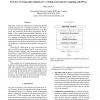Free Online Productivity Tools
i2Speak
i2Symbol
i2OCR
iTex2Img
iWeb2Print
iWeb2Shot
i2Type
iPdf2Split
iPdf2Merge
i2Bopomofo
i2Arabic
i2Style
i2Image
i2PDF
iLatex2Rtf
Sci2ools
FCCM
2002
IEEE
2002
IEEE
PAM-Blox II: Design and Evaluation of C++ Module Generation for Computing with FPGAs
This paper explores the implications of integrating flexible module generation into a compiler for FPGAs. The objective is to improve the programmabilityof FPGAs, or in other words, the productivity of the FPGA programmer. We describe (1) the module generation library PAM-Blox II, the second generation of object-oriented module generators in C++, targeted at computing with FPGAs, and (2) examples of design tradeoffs and performance results using redundant representations for addition and multiplication, and technology mapping of comparison and elementary function evaluation. PAM-Blox II is built on top of a set of extensions to the gate level FPGA design library PamDC to provide a more efficient, portable, scalable, and maintainable module generator library. Using PAM-Blox II we demonstrate a simplified interface to bit-level programability. The simplification results from the bottom-up approach and a close coupling of architecture generation, module generation and gate level CAD....
| Added | 14 Jul 2010 |
| Updated | 14 Jul 2010 |
| Type | Conference |
| Year | 2002 |
| Where | FCCM |
| Authors | Oskar Mencer |
Comments (0)

